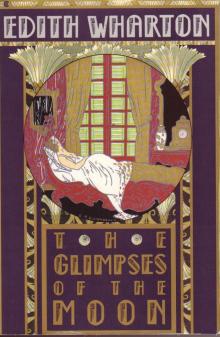- Home
- Edith Wharton
The Lamp of Psyche
The Lamp of Psyche Read online
Wharton, Edith. "The Lamp of Psyche."
Scribner's Magazine 18 (Oct. 1895): 418-28.
I
DELIA CORBETT was too happy; her happiness frightened her. Not on theological grounds, however; she was sure that people had a right to be happy; but she was equally sure that it was a right seldom recognized by destiny. And her happiness almost touched the confines of pain -- it bordered on that sharp ecstasy which she had known, through one sleepless night after another, when what had now become a reality had haunted her as an unattainable longing.
Delia Corbett was not in the habit of using what the French call gros mots in the rendering of her own emotions; she took herself, as a rule, rather flippantly, with a dash of contemptuous pity. But she felt that she had now entered upon a phase of existence wherein it became her to pay herself an almost reverential regard. Love had set his golden crown upon her forehead, and the awe of the office allotted to her subdued her doubting heart. To her had been given the one portion denied to all other women on earth, the immense, the unapproachable privilege of becoming Laurence Corbett's wife.
Here she burst out laughing at the sound of her own thoughts, and rising from her seat walked across the drawing-room and looked at herself in the mirror above the mantel-piece. She was past thirty and had never been very pretty; but she knew herself to be capable of loving her husband better and pleasing him longer than any other woman in the world. She was not afraid of rivals; he and she had seen each other's souls.
She turned away, smiling carelessly at her insignificant reflection, and went back to her arm-chair near the balcony. The room in which she sat was very beautiful; it pleased Corbett to make all his surroundings beautiful. It was the drawing-room of his hotel in Paris, and the balcony near which his wife sat overlooked a small bosky garden framed in ivied walls, with a mouldering terra-cotta statue in the centre of its cup-shaped lawn. They had now been married some two months, and, after travelling for several weeks, had both desired to return to Paris; Corbett because he was really happier there than elsewhere, Delia because she passionately longed to enter as a wife the house where she had so often come and gone as a guest. How she used to find herself dreaming in the midst of one of Corbett's delightful dinners (to which she and her husband were continually being summoned) of a day when she might sit at the same table, but facing its master, a day when no carriage should wait to whirl her away from the brightly lit porte-cochere, and when, after the guests had gone, he and she should be left alone in his library, and she might sit down beside him and put her hand in his! The high-minded reader may infer from this that I am presenting him, in the person of Delia Corbett, with a heroine whom he would not like his wife to meet; but how many of us could face each other in the calm consciousness of moral rectitude if our inmost desire were not hidden under a convenient garb of lawful observance?
Delia Corbett, as Delia Benson, had been a very good wife to her first husband; some people (Corbett among them) had even thought her laxly tolerant of "poor Benson's" weaknesses. But then she knew her own; and it is admitted that nothing goes so far toward making us blink the foibles of others as the wish to have them extend a like mercy to ourselves. Not that Delia's foibles were of a tangible nature; they belonged to the order which escapes analysis by the coarse process of our social standards. Perhaps their very immateriality, the consciousness that she could never be brought to book for them before any human tribunal, made her the more restive under their weight; for she was of a nature to prefer buying her happiness to stealing it. But her rising scruples were perpetually being allayed by some fresh indiscretion of Benson's, to which she submitted with an undeviating amiability which flung her into the opposite extreme of wondering if she didn't really influence him to do wrong -- if she mightn't help him to do better. All these psychological subtleties exerted, however, no influence over her conduct which, since the day of her marriage, had been a model of delicate circumspection. It was only necessary to look at Benson to see that the most eager reformer could have done little to improve him. In the first place he must have encountered the initial difficulty, most disheartening to reformers, of making his neophyte distinguish between right and wrong. Undoubtedly it was within the measure even of Benson's primitive perceptions to recognize that some actions were permissible and others were not; but his sole means of classifying them was to try both, and then deny having committed those of which his wife disapproved. Delia had once owned a poodle who greatly desired to sleep on a white fur rug which she destined to other uses. She and the poodle disagreed on the subject, and the later, though submitting to her authority (when reinforced by a whip), could never be made to see the justice of her demand, and consequently (as the rug frequently revealed) never missed an opportunity of evading it when her back was turned. Her husband often reminded her of the poodle, and, not having a whip or its moral equivalent to control him with, she had long since resigned herself to seeing him smudge the whiteness of her early illusions. The worst of it was that her resignation was such a cheap virtue. She had to be perpetually rousing herself to a sense of Benson's enormities; through the ever-lengthening perspective of her indifference they looked as small as the details of a landscape seen through the wrong end of a telescope. Now and then she tried to remind herself that she had married him for love; but she was well aware that the sentiment she had once entertained for him had nothing in common with the state of mind which the words now represented to her; and this naturally diminished the force of the argument. She had married him at nineteen, because he had beautiful blue eyes and always wore a gardenia in his coat; really, as far as she could remember, these considerations had been the determining factors in her choice. Delia as a child (her parents were since dead) had been a much-indulged daughter, with a liberal allowance of pocket-money, and permission to spend it unquestioned and unadvised. Subsequently, she used sometimes to look, in a critical humor, at the various articles which she had purchased in her teens; futile chains and lockets, valueless china knick-knacks, and poor engravings of sentimental pictures. These, as a chastisement to her taste, she religiously preserved; and they often made her think of Benson. No one, she could not but reflect, would have blamed her if, with the acquirement of a fuller discrimination, she had thrown them all out of the window and replaced them by some object of permanent merit; but she was expected not only to keep Benson for life, but to conceal the fact that her taste had long since discarded him.
It could hardly be expected that a woman who reasoned so dispassionately about her mistakes should attempt to deceive herself about her preferences. Corbett personified all those finer amenities of mind and manners which may convert the mere act of being into a beneficent career; to Delia he seemed the most admirable man she had ever met, and she would have thought it disloyal to her best aspirations not to admire him. But she did not attempt to palliate her warmer feeling under the mask of a plausible esteem; she knew that she loved him, and scorned to disavow that also. So well, however, did she keep her secret that Corbett himself never suspected it, until her husband's death freed her from the obligation of concealment. Then, indeed, she gloried in its confession; and after two years of widowhood, and more than two months of marriage, she was still under the spell of that moment of exquisite avowal.
She was reliving it now, as she often did in the rare hours which separated her from her husband; when presently she heard his step on the stairs, and started up with the blush of eighteen. As she walked across the room to meet him she asked herself perversely (she was given to such obliqueness of self-scrutiny) if to a dispassionate eye he would appear as complete, as supremely well- equipped as she beheld him, or if she walked in a cloud of delusion, dense as the god-concealing mist of Homer. But whenever she
put this question to herself, Corbett's appearance instantly relegated it to the limbo of solved enigmas; he was so obviously admirable that she wondered that people didn't stop her in the street to attest her good fortune.
As he came forward now, this renewal of satisfaction was so strong in her that she felt an impulse to seize him and assure herself of his reality; he was so perilously like the phantasms of joy which had mocked her dissatisfied past. But his coat-sleeve was convincingly tangible; and, pinching it, she felt the muscles beneath.
"What -- all alone?" he said, smiling back her welcome.
"No, I wasn't -- I was with you!" she exclaimed; then fearing to appear fatuous, added, with a slight shrug, "Don't be alarmed -- it won't last."
"That's what frightens me," he answered, gravely.
"Precisely," she laughed; "and I shall take good care not to reassure you!"
They stood face to face for a moment, reading in each other's eyes the completeness of their communion; then he broke the silence by saying, "By the way, I'd forgotten; here's a letter for you."
She took it unregardingly, her eyes still deep in his; but as her glance turned to the envelope she uttered a note of pleasure.
"Oh, how nice -- it's from your only rival!"
"Your Aunt Mary?"
She nodded. "I haven't heard from her in a month -- and I'm afraid I haven't written to her either. You don't know how many beneficent intentions of mine you divert from their proper channels."
"But your Aunt Mary has had you all your life -- I've only had you two months," he objected.
Delia was still contemplating the letter with a smile. "Dear thing!" she murmured. "I wonder when I shall see her?"
"Write and ask her to come and spend the winter with us."
"What -- and leave Boston, and her kindergartens, and associated charities, and symphony concerts, and debating clubs? You don't know Aunt Mary!"
"No, I don't. It seems so incongruous that you should adore such a bundle of pedantries."
"I forgive that, because you've never seen her. How I wish you could!"
He stood looking down at her with the all-promising smile of the happy lover. "Well, if she won't come to us we'll go to her."
"Laurence -- and leave this!"
"It will keep -- we'll come back to it. My dear girl, don't beam so; you make me feel as if you hadn't been happy until now."
"No -- but it's your thinking of it!"
"I'll do more than think; I'll act; I'll take you to Boston to see your Aunt Mary."
"Oh, Laurence, you'd hate doing it."
"Not doing it together."
She laid her hand for a moment on his. "What a difference that does make in things!" she said, as she broke the seal of the letter.
"Well, I'll leave you to commune with Aunt Mary. When you've done, come and find me in the library."
Delia sat down joyfully to the perusal of her letter, but as her eye travelled over the closely written pages her gratified expression turned to one of growing concern; and presently, thrusting it back into the envelope, she followed her husband to the library. It was a charming room and singularly indicative, to her fancy, of its occupant's character; the expanse of harmonious bindings, the fruity bloom of Renaissance bronzes, and the imprisoned sunlight of two or three old pictures fitly epitomizing the delicate ramifications of her husband's taste. But now her glance lingered less appreciatively than usual on the warm tones and fine lines which formed so expressive a background for Corbett's fastidious figure.
"Aunt Mary has been ill -- I'm afraid she's been seriously ill," she announced as he rose to receive her. "She fell in coming down- stairs from one of her tenement-house inspections, and it brought on water on the knee. She's been laid up ever since -- some three or four weeks now. I'm afraid it's rather bad at her age; and I don't know how she will resign herself to keeping quiet."
"I'm very sorry," said Corbett, sympathetically; "but water on the knee isn't dangerous, you know."
"No -- but the doctor says she mustn't go out for weeks and weeks; and that will drive her mad. She'll think the universe has come to a standstill."
"She'll find it hasn't," suggested Corbett, with a smile which took the edge from his comment.
"Ah, but such discoveries hurt -- especially if one makes them late in life!"
Corbett stood looking affectionately at his wife.
"How long is it," he asked, "since you have seen your Aunt Mary?"
"I think it must be two years. Yes, just two years; you know I went home on business after -- " She stopped; they never alluded to her first marriage.
Corbett took her hand. "Well," he declared, glancing rather wistfully at the Paris Bordone above the mantel-piece, "we'll sail next month and pay her a little visit."
II
CORBETT was really making an immense concession in going to America at that season; he disliked the prospect at all times, but just as his hotel in Paris had reopened its luxurious arms to him for the winter, the thought of departure was peculiarly distasteful. Delia knew it, and winced under the enormity of the sacrifice which he had imposed upon himself; but he bore the burden so lightly, and so smilingly derided her impulse to magnify the heroism of his conduct, that she gradually yielded to the undisturbed enjoyment of her anticipations. She was really very glad to be returning to Boston as Corbett's wife; her occasional appearances there as Mrs. Benson had been so eminently unsatisfactory to herself and her relatives that she naturally desired to efface them by so triumphal a re-entry. She had passed so great a part of her own life in Europe that she viewed with a secret leniency Corbett's indifference to his native land; but though she did not mind his not caring for his country she was intensely anxious that his country should care for him. He was a New Yorker, and entirely unknown, save by name, to her little circle of friends and relatives in Boston; but she reflected, with tranquil satisfaction, that, if he were cosmopolitan enough for Fifth Avenue, he was also cultured enough for Beacon Street. She was not so confident of his being altruistic enough for Aunt Mary; but Aunt Mary's appreciations covered so wide a range that there seemed small doubt of his coming under the head of one of her manifold enthusiasms.
Altogether Delia's anticipations grew steadily rosier with the approach to Sandy Hook; and to her confident eye the Statue of Liberty, as they passed under it in the red brilliance of a winter sunrise, seemed to look down upon Corbett with her Aunt Mary's most approving smile.
Delia's Aunt Mary -- known from the Back Bay to the South End as Mrs. Mason Hayne -- had been the chief formative influence of her niece's youth. Delia, after the death of her parents, had even spent two years under Mrs. Hayne's roof, in direct contact with all her apostolic ardors, her inflammatory zeal for righteousness in everything from baking-powder to municipal government; and though the girl never felt any inclination to interpret her aunt's influence in action, it was potent in modifying her judgment of herself and others. Her parents had been in- curably frivolous, Mrs. Hayne was incurably serious, and Delia, by some unconscious powers of selection, tended to frivolity of conduct, corrected by seriousness of thought. She would have shrunk from the life of unadorned activity, the unsmiling pursuit of Purposes with a capital letter, to which Mrs. Hayne's energies were dedicated; but it lent relief to her enjoyment of the purposeless to measure her own conduct by her aunt's utilitarian standards. This curious sympathy with aims so at variance with her own ideals would hardly have been possible to Delia had Mrs. Hayne been a narrow enthusiast without visual range beyond the blinders of her own vocation; it was the consciousness that her aunt's perceptions included even such obvious inutility as hers which made her so tolerant of her aunt's usefulness. All this she had tried, on the way across the Atlantic, to put vividly before Corbett; but she was conscious of a vague inability on his part to adjust his conception of Mrs. Hayne to his wife's view of her; and Delia could only count on her aunt's abounding personality to correct the one-sidedness of his impression.
Mrs. Hayne liv
ed in a wide brick house on Mount Vernon Street, which had belonged to her parents and grandparents, and from which she had never thought of moving. Thither, on the evening of their arrival in Boston, the Corbetts were driven from the Providence Station. Mrs. Hayne had written to her niece that Cyrus would meet them with a "hack;" Cyrus was a sable factotum designated in Mrs. Hayne's vocabulary as a "chore-man." When the train entered the station he was, in fact, conspicuous on the platform, his smile shining like an open piano, while he proclaimed with abundant gesture the proximity of "de hack," and Delia, descending from the train into his dusky embrace, found herself guiltily wishing that he could have been omitted from the function of their arrival. She could not help wondering what her husband's valet would think of him. The valet was to be lodged at a hotel: Corbett himself had suggested that his presence might disturb the routine of Mrs. Hayne's household, a view in which Delia had eagerly acquiesced. There was, however, no possibility of dissembling Cyrus, and under the valet's depreciatory eye the Corbetts suffered him to precede them to the livery-stable landau, with blue shades and a confidentially disposed driver, which awaited them outside the station.
During the drive to Mount Vernon Street Delia was silent; but as they approached her aunt's swell-fronted domicile she said, hurriedly, "You won't like the house."
Corbett laughed. "It's the inmate I've come to see," he commented.
"Oh, I'm not afraid of her," Delia almost too confidently rejoined.
The parlor-maid who admitted them to the hall (a discouraging hall, with a large-patterned oil-cloth and buff walls stencilled with a Greek border) informed them that Mrs. Hayne was above; and ascending to the next floor they found her genial figure, supported on crutches, awaiting them at the drawing-room door. Mrs. Hayne was a tall, stoutish woman, whose bland expanse of feature was accentuated by a pair of gray eyes of such surpassing penetration that Delia often accused her of answering people's thoughts before they had finished thinking them. These eyes, through the close fold of Delia's embrace, pierced instantly to Corbett, and never had that accomplished gentleman been more conscious of being called upon to present his credentials. But there was no reservation in the uncritical warmth of Mrs. Hayne's welcome, and it was obvious that she was unaffectedly happy in their coming.

 The Age of Innocence
The Age of Innocence The Reef
The Reef Summer
Summer The Glimpses of the Moon
The Glimpses of the Moon Xingu
Xingu The Fruit of the Tree
The Fruit of the Tree Fast and Loose
Fast and Loose Artemis to Actaeon and Other Verse
Artemis to Actaeon and Other Verse The Line of Least Resistance
The Line of Least Resistance The Lamp of Psyche
The Lamp of Psyche The Reckoning
The Reckoning Afterward
Afterward The New York Stories of Edith Wharton
The New York Stories of Edith Wharton The 2014 Halloween Horrors Megapack
The 2014 Halloween Horrors Megapack 'Copy': A Dialogue
'Copy': A Dialogue The Recovery
The Recovery The Fulness of Life
The Fulness of Life Early Short Stories Vol. 1
Early Short Stories Vol. 1 Tales of Men and Ghosts
Tales of Men and Ghosts The House of the Dead Hand
The House of the Dead Hand That Good May Come
That Good May Come The Buccaneers
The Buccaneers Other Times, Other Manners
Other Times, Other Manners The Hermit and the Wild Woman
The Hermit and the Wild Woman Kerfol
Kerfol The Duchess at Prayer
The Duchess at Prayer Bunner Sisters
Bunner Sisters The Choice
The Choice Madame De Treymes
Madame De Treymes Ethan Frome, Summer, Bunner Sisters
Ethan Frome, Summer, Bunner Sisters In Morocco
In Morocco The Valley of Decision
The Valley of Decision Age of Innocence (Barnes & Noble Classics Series)
Age of Innocence (Barnes & Noble Classics Series) The Angel at the Grave
The Angel at the Grave April Showers
April Showers Sanctuary
Sanctuary The Bunner Sisters
The Bunner Sisters Mrs. Manstey's View
Mrs. Manstey's View Writing a War Story
Writing a War Story The Custom of the Country
The Custom of the Country In Trust
In Trust The Triumph of the Night
The Triumph of the Night The Hermit and the Wild Woman, and Other Stories
The Hermit and the Wild Woman, and Other Stories Roman Fever and Other Stories
Roman Fever and Other Stories The Mission of Jane
The Mission of Jane The Descent of Man and Other Stories
The Descent of Man and Other Stories Coming Home
Coming Home The Touchstone
The Touchstone Early Short Stories Vol. 2
Early Short Stories Vol. 2 Edith Wharton's Verse, 1879-1919, from various journals.
Edith Wharton's Verse, 1879-1919, from various journals.